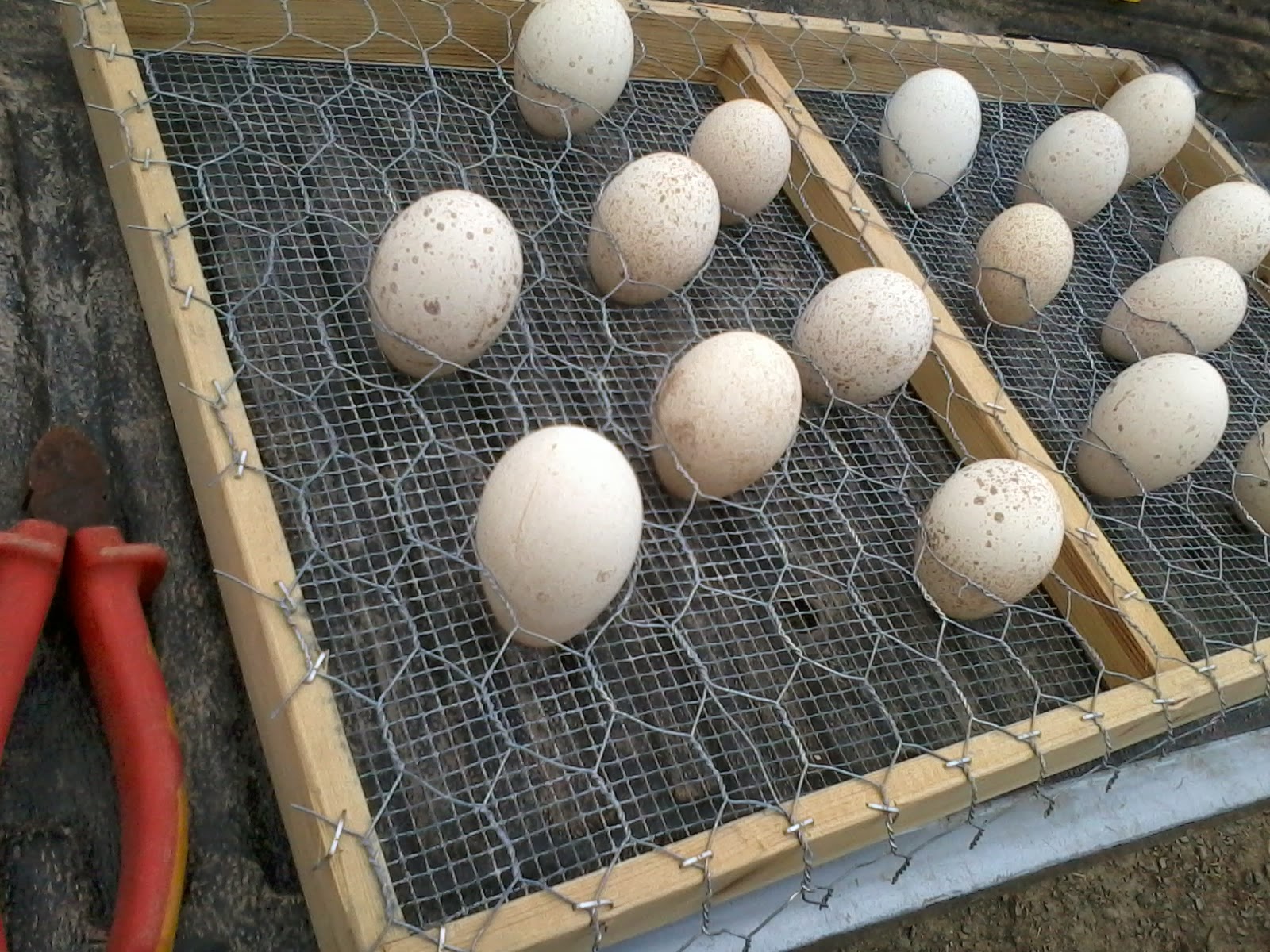Phew.
I drove our last sold hatch to a game farmer, along with a ten week old labrador puppy that we found on behalf of a client. Finding dogs for shoot clients is another gamekeeper duty, but a very pleasant one. Travelling with a truckful of baby chicks and a puppy made me a bit hit at the rest stop car park.
A lot of neighbours gave up their time to help us through our first year: collecting eggs in the laying pens, counting out hatched day-old pheasants into travel boxes, and putting bits the growing birds on our field. (Bits are soft plastic nose rings that fit in the bird's nostrils and between the beak. It allows the birds to pick at feed but not to pick on each other). As a thanks to our
I'm starting the ball rolling tomorrow with some of our turkey eggs. As the inserts for our incubator trays only fit smaller eggs, I had to fashion an insert from chicken wire stapled on a frame, to hold my big turkey eggs secure while the drum inside the incubator turns and tilts them through their 28-day hatching cycle.
I hope it will work. I hope the eggs are fertile!
I'll also hatch some Buff Orpington eggs to increase our stock, downsized to a rooster and three hens when we moved from Dorset to Hereford. So eggs have been off the menu for the past couple of weeks while I saved enough to hatch. It's not too much of a hindrance to my cooking; Mike only takes eggs in cake or cookie form, and the now free-ranging laying pheasants continue to drop eggs in the field across the lane. I simply gather enough for baking, and sometimes a few extras for adding to the dogs' dinner. I have missed the eggs as currency. My gardening neighbours have gladly swapped me gluts of broad beans, beets, and new potatoes for what I feel is a meagre trade of a dozen eggs. They leave surprise packages of vegetables in the bed of my parked truck while I'm feeding Kitty. It's like Christmas, but better.
My own garden should have an "Under Construction" sign posted. All I'm creating this year is compost and space. Weeds and bamboo have invaded the garden. I cut down the first clump of bamboo and found an entire mature apple tree inside it.
I should give up my sheep and keep a flock of pandas instead.
The pheasant chicks hatched for our shoot are growing well. (Even the chick raised by Turkey Mom fledged this week.) As sickly as the pheasant mothers were, their offspring are the picture of avian health. Each house on our field holds pheasants a week apart in age. In one house. the youngest are still hugging their heat lamps and eating crumbs in tight nursery groups; in another, the older birds are let outside in grass pens to stretch their wings, chase flying insects, and dust bathe to their tiny heart's content. The oldest birds have their bits removed (simply flick out between thumb and forefinger) and get taken in special crates on the back of our trucks to big pens in the woods. "Going to wood" is a trying time for both birds and keepers. They're released, on their own recognizance, where they join nature's food chain.
Our first birds of the season have gone to wood. We spent five hours on Saturday crating birds. On release they flew straight up into trees, peeping and whistling. They had a relatively uneventful weekend.
Until last night.
Predators are just part of the deal when raising any kind of livestock. Your first line of defence is, well, a line of defence - in our case a big wired-in area surrounded by electric fencing. Somehow a fox breached our defences in the early hours of this morning. Mike woke me at 6am with a cup of tea and the bad news.
After breakfast, Quincy and I went to search through the woods outside the pen for casualties. Foxes seem to kill for fun, and will tear through every bird it can spook out of a pen. Quincy worked quietly in the covert outside the pen and, after a half hour's work, retrieved thirty cold, dead pheasant poults. One retrieve was just a head! (Shudder..) I think even the dog - usually a retrieving machine - got too down-hearted to search out much more.
I will take Pip over there later and expand our search. I suspect Mike will spend the night out by the pen, with the birds for bedfellows. Second line of defence: night vision and a rifle. It might just be Mr. Fox's last visit to the pen.
We will repeat this going to wood with birds seven more times, in seven more pens. As the pens fill, our days get longer checking that batteries on electric fences are charged, the wires aren't dead shorting on nettles or fallen branches, and that birds of prey aren't worrying poults. Oh yeah, attacks come from above too, usually more devastating as there's no roof on the pens and the perpetrators are protected species. All we can do is dissuade them with our presence. Hence, loooong days and very early morning starts.
Actually I think I might just go and hide in the bamboo until shoot season starts.


